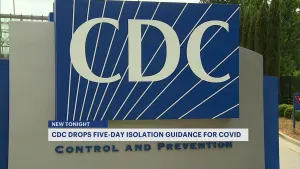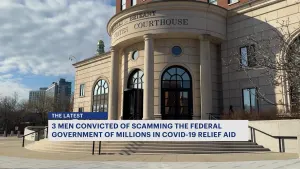Pfizer makes strong case for booster vaccine, but not everyone behind it
Pfizer released data this week that shows its two-dose vaccines efficacy drops to low- to mid-80% after four to six months.
•
Jul 29, 2021, 9:54 PM
•
Updated 1,494 days ago
Share:
More Stories
0:22

Cold Spring Village Hall closed due to COVID-19 surge and staff shortages
356ds ago
Hometown Heroes in the Hudson Valley
403ds ago1:28

Medical experts recommend to still take precautions following CDC's revised COVID isolation guidelines
547ds ago1:52

Judge: 3 men convicted in COVID-19 relief aid fraud
568ds ago1:47

Wondrous Things store in Briarcliff Manor to close after 34 years; everything 25% off
695ds ago0:28

Rockland small businesses get COVID-19 reimbursement grant
696ds ago0:22

Cold Spring Village Hall closed due to COVID-19 surge and staff shortages
356ds ago
Hometown Heroes in the Hudson Valley
403ds ago1:28

Medical experts recommend to still take precautions following CDC's revised COVID isolation guidelines
547ds ago1:52

Judge: 3 men convicted in COVID-19 relief aid fraud
568ds ago1:47

Wondrous Things store in Briarcliff Manor to close after 34 years; everything 25% off
695ds ago0:28

Rockland small businesses get COVID-19 reimbursement grant
696ds agoPfizer is making a stronger case for a third shot in the arm against the coronavirus, but not everyone is behind the booster.
Pfizer released data this week that shows its two-dose vaccines efficacy drops to low- to mid-80% after four to six months.
Dr. Arthur Caplan, NYU School of Medicine's medical ethics director, says he doesn't believe more vaccines are the answer, but rather more vaccinations.
"If we had high vaccination in the U.S. and around the world, that's the best protection against new variants," says Caplan.
Only about half of New York – and the country - is currently fully vaccinated. For true herd immunity to crush COVID-19 for good, Caplan says we should be over 85%.
"If you keep chasing vaccines that are effective against the latest variant, the virus - if we don't all get vaccinated - is going to continue to produce new strains that get around the vaccines. It's a losing effort," says Caplan.
Pfizer insists its booster is needed six months after the second dose to provide the "highest degree of protection."
Israel became the first to do so this week, administering third doses of the COVID-19 vaccine to people 60 and over.
Caplan believes COVID-19 is here for good, similar to the flu, and without higher vaccinations it'll be a difficult fight.
"Four-fifths of the world hasn't gotten any vaccines, that's where you're going to get new strains like the flu. They percolate and pop up. So, I think COVID is going to be with us, and we're going to have to deal with that reality, but we can certainly cut the damage if we can do more vaccinations," says Caplan.
Pfizer is planning to share more definitive data for its booster with U.S. regulators in the coming weeks.
More from News 12
1:23

Labor Day soccer tournament in Yorktown marks its 50th year
2:04

Here are some ways to alleviate chronic pain before turning to surgery
0:24

Woodbury police issue 60 summonses during enforcement detail for trucks
0:36

Man charged with drunk driving in Ramapo month after previous DWI arrest
1:48

Mourners say final goodbyes to 16-year-old Port Chester HS student killed in rollover crash
1:47
